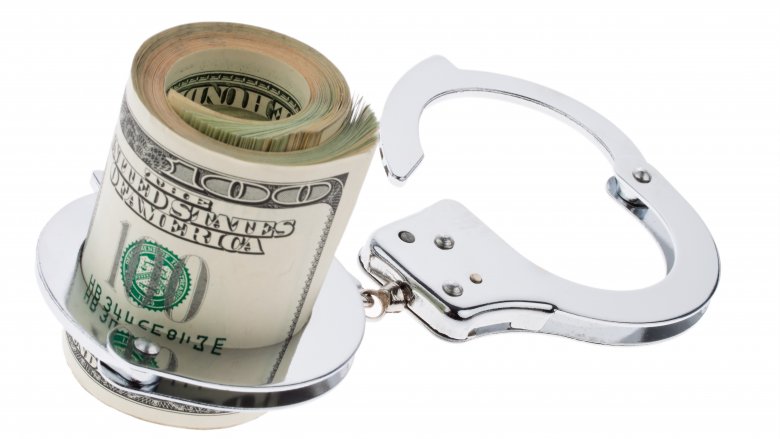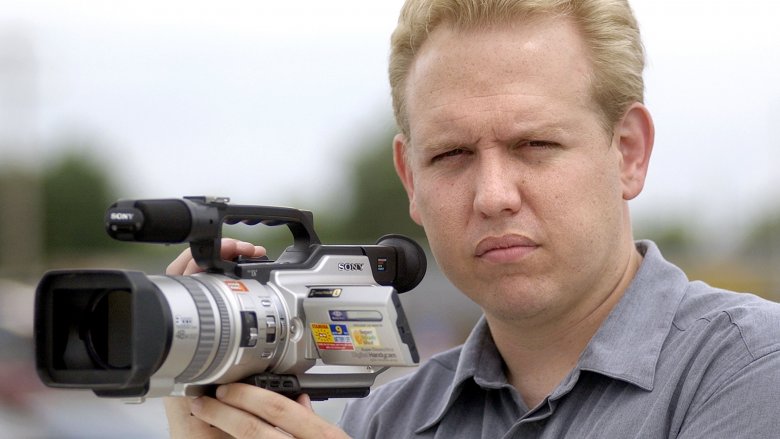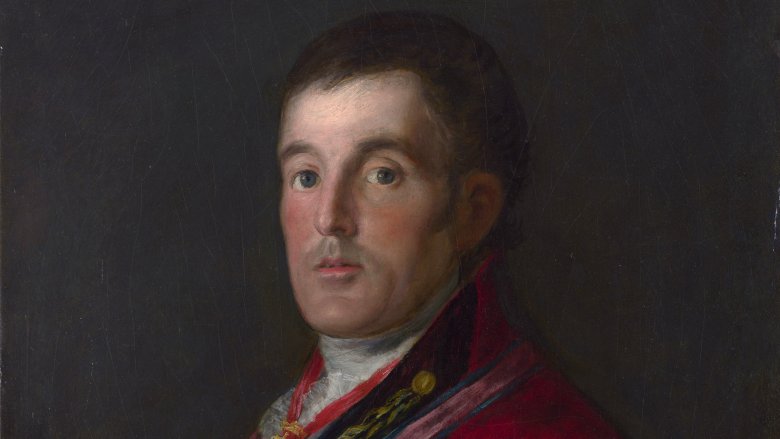Real-Life Vigilantes Who Went To Bizarre Extremes
Good guys always do what they must, but heroes always do what they can. That's why society idolizes fictional vigilantes like Batman, Spider-Man, Aquaman, and countless others. Their greatness extends far beyond punching prowess, fancy weapons, or ridiculous fish telepathy. At their cores, they're individuals who will do anything short of everything to advance a righteous aim. The real world doesn't have a lot of figures like that, but they do exist. Not all of these self-anointed do-gooders wear Bat-Suits or bonk bad guys. In fact, some verge on villainy. But hey, nobody's perfect.
Moral combat
If someone introduced themselves to you as a "spiritual ninja," you might karate kick them in the jaw for sounding stupid. But if you tried that with Ken Andre, you'd likely take a nunchuck to the knee. That's because in addition to sounding like a parody of kite-high hippies, Andre is an ex-service member and skilled martial artist. But don't worry; he doesn't use "spiritual ninja" as an official title, just an unfortunate description. Instead, he goes by the intimidating-ish moniker, Shadow.
You might dismiss Andre as an oddball who enjoys wearing ninja outfits, but there's more to him. In 2011, the South West News Service covered Andre's origin story, and as it turns out, his desire to help others is driven by childhood helplessness. As a boy, Andre watched his mother get brutalized by boyfriends. Eager to defend the innocent, he studied the art of ninja-ing and eventually developed his Shadow persona.
In his quest to thwart violent abusers and other miscreants, Andre conducts night patrols wielding nunchucks and a wooden pole in the small town of Weymouth in southern England. He unleashes a battle cry to make criminals think twice. He even wears a hearing aid to better detect screams and other sounds of distress. While he always prepares for conflict, Andre doesn't seek it. When possible, he tries to deescalate hostile encounters. When not, he's liable to kick a guy's keister and vanish into the darkness like a –- oh, so that's why he calls himself Shadow.
The ham burglars
It's hard to picture a food-themed Robin Hood. Would his merry men include Fryer Tuck, Mead Marian, and Little Caesar? Would they call their hideout Sherbet Forest? Probably so, but almost no one would take them seriously. But that didn't stop a colorfully clad group of Germans from running with a similar notion, even as lawmen laid chase.
Enter Hamburg Umsonst (or "Hamburg for free"), a team of over-the-top outlaws that formed in 2003. As per The Guardian, its members used catchy code names like Spider Mum and Sante Guevara and rocked flashy costumes to boot. Their aim was as simple as their outfits were silly: to protest economic inequity. Sick of seeing fat cats feast like kings while most people's wallets starved, Hamburg Umsonst performed acts of not-so-civil disobedience. Some of their antics seemed fairly tame, like teaching people how to sneak into movie theaters. But they also engaged in flat-out thievery, ransacking restaurants and high-end supermarkets that cater to superstars and businesspeople.
In 2005, for instance, Hamburg Umsonst stormed a Michelin-starred eatery and snatched up an entire buffet. The following year, they stole €1,500 worth of Kobe beef, bio-cheese, chocolate, and Serrano ham from a gourmet grocer. Then, after stopping for pictures, they successfully evaded a fleet of cops and a freaking helicopter. But rather than gorging on their sumptuous spoils, the beef bandits supposedly gave the food to low-wage workers. They've since seemingly vanished, perhaps having sated their hunger for rebellion.
Magnum dope-us
People largely associate large-scale drug operations with cutthroat throat-cutters and folks who use gunshots as handshakes, but some big-time dope dealers have the killer instinct of a Care Bear and opt to arm themselves with reassuring hugs. U.K. couple Susan Cooper and Michael Foster certainly fell into that category.
Working from a pair of farmhouses in rural England, Foster and Cooper sold an estimated £400,000 worth of self-grown weed, according to The Telegraph. To hide their dealings from narcs, they passed their pot plant off as a "pottery business." But despite embracing a life of criminality and chronic puns, the couple didn't let their morals go to pot. Instead, Cooper and Foster behaved like cannabis-powered Santa Clauses. Except, rather than stuffing stockings with THC and Doritos, they gave the gifts of TLC and dinero to a group of struggling villagers.
The drug-dispensing duo spent a huge chunk of their illicit income on life-changing and sometimes life-saving endeavors in Diani, Kenya. As The Telegraph recounted, Cooper and Foster financed everything from eye surgery to children's education. In one case, they saved a man's life by paying for a much-needed leg amputation. Unfortunately, philanthropy isn't enough to halt a judge's gavel. Once cops caught on, the couple was arrested, sentenced to three years in prison in 2012, and ordered to pay the government £60,000. Good thing, too. That drug money might have gone to something sinister, like school books.
The loan wolf
Nowadays, people link banks with crashing economies, laundering money for terrorists, and illegally foreclosing on veterans. Frankly, that's not a good look. If anything, it gives the impression that bankers have souls made of soiled toilet paper. However, during the 2000s, a man named Jeffrey Gonsiewski proved that at least some money men have hearts of gold.
As the FBI elaborated, Gonsiewski worked at the Illinois-based First Security Trust and Savings Bank. As vice president of the loan department, he had a duty to make sure debtors paid on time or paid the price. But Gonsiewski refused to fault defaulters. On the contrary, he falsified files to hide borrowers' belated payments. According to the Chicago Tribune, he wanted to give clients a chance to get on their feet. But by trying to buy time, Gonsiewski cost his bank over $5 million.
Between 2004 and 2009, the benevolent banker altered a minimum of 100 loans to aid at least 50 customers. Moreover, he exaggerated loan applicants' assets to help them get approved. Inevitably, Gonsiewski's big heart got him in big trouble. He got terminated from his job and received a 63-month prison term for fraud. That almost sounds too harsh for a world where lenders literally steal people's homes and merely get slapped with fines. Caring too much about customers might be the worst vice a bank VP can have.
Robbing hoods
Drug addiction turns getting high into one of life's low points. It enslaves the body, empties the wallet, and purportedly turns brains into fried eggs. Viewed from this perspective, it sort of makes sense that drugs get governments up in arms. Failure to act could result in a world of cackling cokeheads with omelets between their ears. Of course, some anti-drug warriors care nothing about breakfast brains. Craig Glazer and Don Woodbeck, for instance, simply wanted payback.
As UPI detailed, Glazer and Woodbeck were fine and dandy with dope until a dangerous figure called J.D. did them wrong in a series of drug deals during the late 1960s. Woodbeck professedly smuggled pot with J.D. until their relationship went south and J.D. went homicidal. Glazer's gripe stemmed from drug peddlers robbing his buddies, according to the LA Times. Eventually, the two men joined forces and began sticking up dope dealers while dressed as cops and other government agents.
The faux Five-O allegedly pulled off 33 robberies from Massachusetts to Arizona. The duo further claimed to have shot J.D. Evidently, the real cops were impressed because they employed Glazer and Woodstock as undercover officers, but their glory days were disaster-bound. First, they got canned for framing suspects. Then someone (perhaps a drug pusher) killed Woodbeck. Later, Glazer was convicted for laundering money in a scheme to rip off dope dealers who were secretly narcs. Ironically, Glazer's addiction to fighting drugs was his downfall.
Shame of drones
Many people abhor prostitution. Some think it's yucky to diddle dudes or dudettes for dollars. Others recoil at the risk of disease. There's also the issue of pimps, who are basically society's moral pimples. Whatever your personal stance, you probably get why governments and citizens alike might want to discourage or outright ban such a peril-plagued industry. But you may have a tough time comprehending why an opponent of prostitution would film it for a living.
Some call him the "Video Vigilante." Others probably call him a pervert. He calls himself "a 10 o'clock news station's dream." He is none other than Brian Bates (pictured above), an Oklahoma City resident who films prostitutes in the act and actively shames their customers. The LA Times explained that it all began when Bates came across a prostitute and her john going at it in his driveway. Incensed, Bates set out to punish would-be johns by exposing their indiscretions on a personal website. His exploits (or exploitation) became so popular that he turned his pursuit into a full-blown business.
Bates' vengeful voyeurism has taken him to some dark places. In 2005, The Smoking Gun revealed that Bates baited prostitutes into setting up their clientele. In an act of mind-melting hypocrisy, Bates paid professional pleasure maidens to get down and dirty in easy-to-film places. Thankfully, he no longer resorts to such dubious tactics. As he told The Oklahoman in 2015, Bates now uses camera-fitted drones to spy on people's naked shenanigans.
Thief Wellington
The U.K. specializes in depressing weather and vitamin D deficiency. So it makes sense for Brits to take television seriously. It's likely their main source of sunshine, after all. Even so, it would take a special kind of crazy to commit a historic heist over TV access. Luckily for history, John Bunton fit that bill.
Coincidentally, it was a bill that led to Bunton's crime, namely the BBC license fee. For the unacquainted, the U.K. essentially levies a tax for watching TV. During the 1960s, Bunton's dad, Kempton, led the charge against that charge. As The Guardian explained, Pa Bunton felt the fee placed undue strain on retirees. To bolster his father's crusade, John Bunton became the first person to rob London's National Gallery.
Aided by a ladder and an unsecured bathroom window, J-Bun entered the building and exited with a famed Goya painting of the Duke of Wellington. He then delivered it to daddy. Kempton Bunton in turn tried to ransom the artwork for £140,000, which he intended to give to charity. However, the plan flopped like a panicked salmon. He eventually returned the painting and served three months behind bars for stealing its frame (authorities deemed him too old and oval-shaped to have stolen the portrait). John Bunton later confessed but never did time. In fact, his admission wasn't made public for 51 years. His crime, meanwhile, was referenced in a Bond film. If that's not winning at life, nothing is.
Mobile pwn
Talking or texting while driving can really wreck a person's day. Just imagine how many people tragically miss highway exits because of inane yapping. Plus, it increases car accidents, which are also bad. Most states have passed legislation to curtail cellphone use on the road. But clever motorists can skirt such laws by ignoring them. Concerned citizen Jason Humphreys, however, found a surefire way to shut them up.
As the Tampa Bay Times outlined, Humphreys took the highly illegal route of jamming people's mobile phones. For a period of 16 to 24 months, the 60-year-old policed a stretch of Florida highway with a device designed to obstruct cell signals. Of course, this would also hinder passengers, actual police, and anyone else whose job actually entails talking while driving. Apparently, in his fervor to make the highway a dead zone, Humphreys forgot that things like ambulances exist. Furthermore, in trying to reduce accidents by disabling phones, he ensured that no one nearby could call for help if an accident actually happened. In retrospect, it wasn't a great plan.
In 2013, Metro PCS surmised that someone was actively sabotaging cellphones during certain times of day. Sheriffs quickly zeroed in on Humphreys and noticed their two-way radios had zero reception in his vicinity. Humphreys assured officers that he only meant to silence motorists within a 30-foot radius but accidentally disrupted cell towers. As per PC Mag, in 2016, the FCC communicated its dismay with a $48,000 fine.
The road-worrier
Whenever Uber enters a new place, existing ride services get defensive. After all, no one likes interlopers, especially when they intercept customers. Customarily, competitors (and everyone else on Earth) attack Uber litigiously, citing its questionable business practices. But one angry Aussie haunted Uber drivers like an avenging road wraith.
That wrathful wraith was Russell Howarth, a non-ghost who spent 2014 placing Uber drivers under citizen's arrest. (Above is a video he made to brag about it.) Financially and perhaps ethically bankrupt, he was something of a mixed bag. The Guardian pointedly observed that the self-proclaimed "Uber Vigilante" is married to the owner of a rival ride-sharing service. So clearly, Howarth wasn't driven by altruism. However, he also had a legal justification. As the Sydney Morning Herald acknowledged, when Uber began operating in New South Wales, its activities ran afoul of the Passenger Transport Act (which the state later amended). Howarth both recognized and reviled this fact.
Hoping to put Uber in its place and out of business, Howarth ordered rides from the company for the sole purpose of detaining its employees. During one of those encounters he placed a driver in a wrist hold and called police to the scene. In a separate altercation highlighted by the Sydney Morning Herald, Howarth tailed his target like a sanctimonious stalker until he could make an arrest. Predictably, Uber hit back with a lawsuit. A judge put the brakes on Howarth's harassment and required him to pay $400,000 in court costs.
Writing wrongs
Native English speakers are super touchy about grammar, so much so that individuals who often correct it get called Nazis. That's intensely nonsensical, but is it more ludicrous than a man who spends his nights checking building signs for bad punctuation? Yes, actually, but not by much. If you ask the U.K.'s grammar vigilante, however, he'd likely tell you his deeds make all the sense in the world.
People have compared him to the great graffito Banksy, according to The Guardian. But whereas Banksy makes poignant observations with brilliant imagery, the grammar vigilante removes redundant apostrophes and adds omitted ones. The similarities are ... not undeniable. Negatives notwithstanding, the English rule enforcer has dedicated over a decade of his life to minding businesses' business. The vigilante's vigil started in 2003 when he removed needless apostrophes from a council building's sign. Apparently, the rush of being right propelled him to keep going.
During his travels, the unnamed nitpicker carries a modified ladder and a pole he calls the "apostrophiser," ensuring that few mistakes escape his reach. But whether his pursuit is itself is a mistake is up for debate. Naturally, grammar sticklers laud his cause, but business owner John Singh called the endeavor "rude" and potentially costly. Singh told The Telegraph that alterations made to his store sign could cost thousands of pounds to undo, though that sounds like a high price to remove some stickers. The vigilante defended his actions by calling some grammatical oversights "just wrong." Of course, to some, his campaign is just vandalism.
Doctored prescription
Any doctor will tell you that eating garbage is like throwing your life away. But it's not always easy to stock your fridge with quinoa and kale sandwiches. For example, according to Statistics Canada, a community health survey determined that 8.3 percent of Canadian households experienced food insecurity between 2011 and 2012. Put plainly, about 1 in 12 families survived on subpar diets, usually for financial reasons. Sadly, treating that problem takes more than prescribing healthier food. You also have to defraud the government.
Luckily for Roland Wong's patients, he didn't mind a little swindling, or even a lot of swindling. As the Toronto Star detailed, the Ontario-based physician regularly lied to help poor families qualify for government-funded food stipends. For over three years, Wong diagnosed entire families with constipation and assorted food allergies, mostly without running tests. By the time he was caught, the doctor had written 13 percent of all the special diet forms in Ontario. Thankfully, the Hippocratic Oath says nothing about lying. However, the law does.
Wong's deceit cost the government $1.8 million. He himself illegally earned $718,000, but instead of splurging on solid gold stethoscopes, Wong spent most of his earnings on food for his patients and food bank donations. Despite clearly intending to do no harm, the doctor lost his license for six months, the Toronto Star reported. He also got slapped with a $60,000 fine. Wong's greatest regret: being unable to see his patients.











